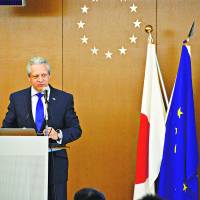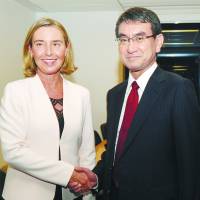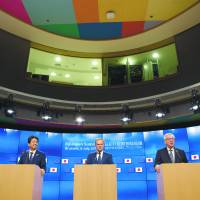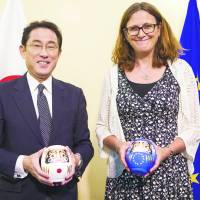Once again, I am honored to be able to address the distinguished readers of The Japan Times on the occasion of Europe Day. May 9, 1950, was a historic day for Europe, when then-French Foreign Minister Robert Schuman set out a vision that has for more than six decades released the continent from the constant fear of war and ushered in a period of prosperity that would have been unimaginable just a few generations ago.
This year, I am particularly happy and proud to be able to report a significant development in the ever-deepening relations between the European Union and Japan. Just last month, the European Commission signed off on the EU-Japan economic partnership agreement (EPA) and proposed to the EU Council that it be approved. Negotiations between the two sides were concluded in December. We are aiming for its enactment before the end of the current mandate of the European Commission next year.
Japan is the EU’s second-largest trading partner in Asia after China, and this EPA is the biggest bilateral trade deal the EU has ever negotiated, opening huge market opportunities for both sides. Together, we will create a free trade zone covering 600 million people and one-third of global gross domestic product. Furthermore, it is also the EU’s first trade deal to explicitly commit to the Paris agreement on climate change.
When negotiations began in the spring of 2013, the EU had called the envisioned result a free trade agreement. In fact, the end product has grown in scope and depth to an extent that is more accurately reflected in the designation, long used by our Japanese partners, of “economic partnership agreement.” With the agreement, the EU and Japan have committed not to relax domestic labor and environmental laws to attract trade and investment, to conserve and sustainably manage natural resources and address biodiversity, forestry and fisheries issues.
We should also recall that along with the EPA, negotiations with Japan continue on investment protection standards and investment protection dispute resolution. Both sides are firmly committed to move toward an agreement in the investment protection negotiations as soon as possible, in light of the shared commitment to a stable and secure investment environment in Europe and Japan.
But this is not just a great achievement for the EU and Japan, and it is not just about our economies — it sends a clear and unambiguous message that we stand together against protectionism and in defense of multilateralism. The EU has always been a champion of an open global trading system, and the conclusion of negotiations with Japan sends a strong message to the rest of the world that we stand together with Japan to shape globalization, stand up for open trade and agree on a rulebook that is fair and works for everyone.
I am also hopeful for the bilateral strategic partnership agreement (SPA), for which negotiations have concluded and legal steps have been taken in preparing for the future signing. This pact will upgrade bilateral political relations by reinforcing political dialogue, affirming shared values and common principles and enabling closer cooperation to tackle common challenges, both bilaterally and in multilateral fora.
While many in Japan may still view the EU as a major economic player, the truth is that over the decades, and in past years especially, our union has evolved into so much more. The EU now plays a key role on the international stage in such areas as diplomacy, the promotion of human rights, development and humanitarian aid and working with multilateral organizations such as the United Nations. The EU and its 28 member states are together the world’s largest aid donor, and we continue to be at the forefront of international efforts to fight climate change.
The EU also contributes to global security. Under our Common Security and Defence Policy, the EU operates civilian and military missions worldwide that carry out a wide range of tasks, ranging from managing borders to training local police. As just one example, through the EU Naval Force Operation Atalanta, we have been tackling piracy off the coast of Somalia, an ongoing, multilateral effort in which Japan has also been active.
As strategic partners that share values such as democracy, open markets, respect for human rights and the rule of law, I am confident that the EPA and SPA — together with the various bilateral dialogues that are already in place — will prove to be springboards that will take EU-Japan relations to a new level.
Our delegation to Japan also strives to present the human face of Europe through a wide range of events that showcase the EU’s diversity and the breadth of its interaction with the world, not least with youth. At the end of the day, it is often the experiences gained at a grass-roots level that enable both sides to appreciate the relationship we have.
This year, we have particular causes to push these softer aspects of Europe to the fore, as 2018 has been designated the European Year of Cultural Heritage, and we are celebrating the intricate tapestry that has been woven from our literature, art, crafts, oral traditions, food, films, architecture, landscapes and more — all which we feel is imperative to pass on to future generations, so that they build on what we have and take the concept of Europe even further forward.
Later this month, with the cooperation of relevant interlocutors in our member states, we will be organizing two of our flagship public diplomacy events: the European Higher Education Fair and the EU Film Days. The former, which encourages Japanese students to consider the wide range of higher education opportunities that Europe has to offer, will this year be held in Tokyo and Osaka. Meanwhile, the latter will be organized in Tokyo, Kyoto and Hiroshima with yet another interesting mix of films that will hopefully attract cinema fans far and wide. In November, we hope to build on the success of our inaugural European Literature Festival of last year, where we were able to bring literary works from several EU member states to the Japanese public.
All that has happened to galvanize the relationship between the EU and Japan since I addressed The Japan Times on Europe Day last year has proved how we can successfully stand together to maintain our values and remain committed partners, working tirelessly for the betterment of the entire world.

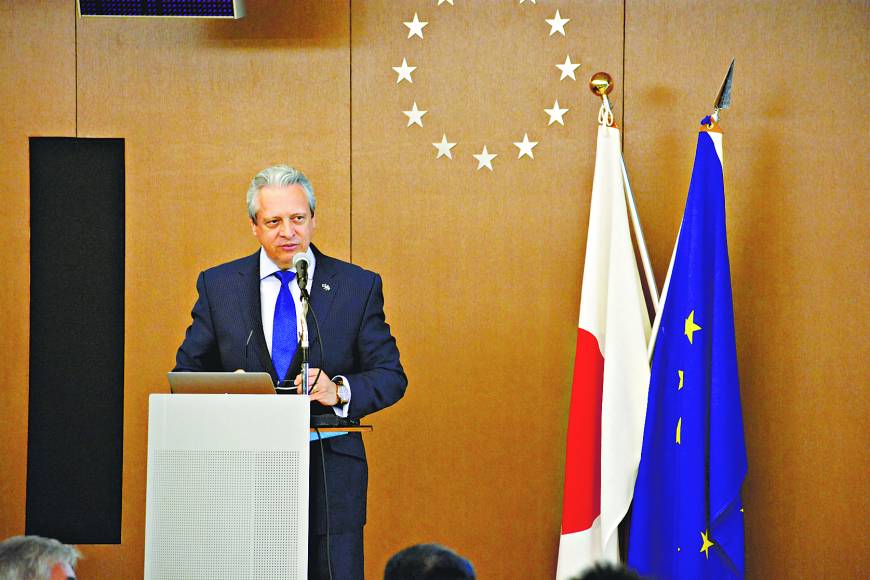



 Click to enlarge
Click to enlarge
